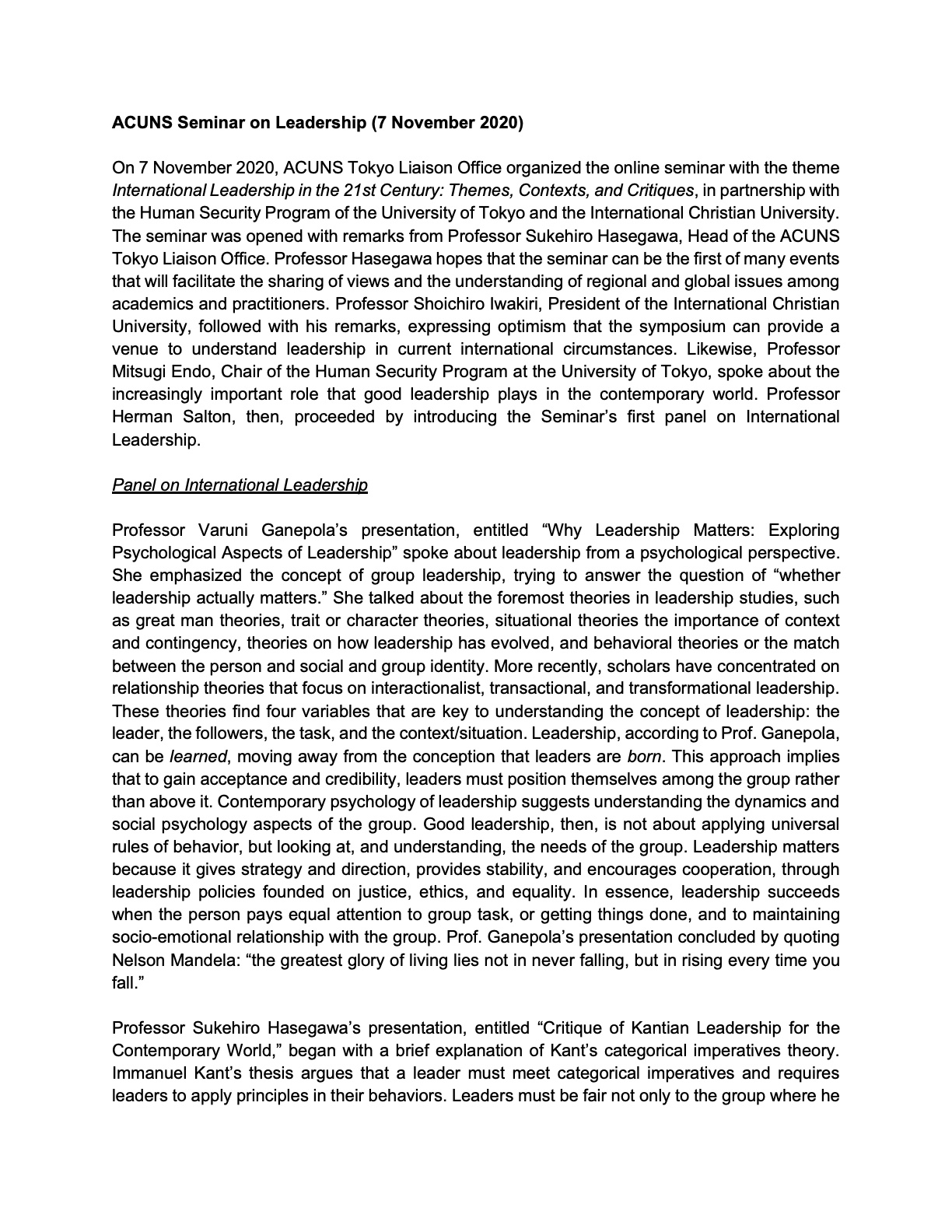HSP Seminars (#286) “地域創生・SDGs 実学概論” (Nov. 22–25, 2021)
The Recording of the HSP Admission Guidance Session [closed]
We held the 2nd HSP Admission Guidance Session on Oct 30, 2021.
You can watch the recording of the session below until Nov. 12 (Fri.), so please check it out.
Note: The session was held in Japanese.
The recording has been closed.
(日本語) 2022年度学生募集要項(改訂版)
The HSP Admission Guidance Session (Oct. 30, 2021)
The HSP Admission Guidance Session will be held as follows. Prospective students are encouraged to come and find more about the HSP.
- Date: Oct. 30 (Sat.), 2021, 15:00-
- Venue: Online (Zoom)
If you would like to join the session, please fill out the form below and press ‘send’ (送信) till Oct. 28 (Thurs.).
On Oct. 29 (Fri.), we will send the link to the registered addresses.
If you do not receive an email until 23:00 on Oct. 29, please contact HSP (hsp-toiawase [at] hsp.c.u-tokyo.ac.jp) by email.
Note: Explanation and instruction will be given in Japanese.
The session has been closed. You can watch the recording of the session until Nov. 12 (Fri.), so please check it out.
HSP Seminar (#285) “Magnitsky laws: Protecting the freedom of expression” (Jul. 8, 2021)
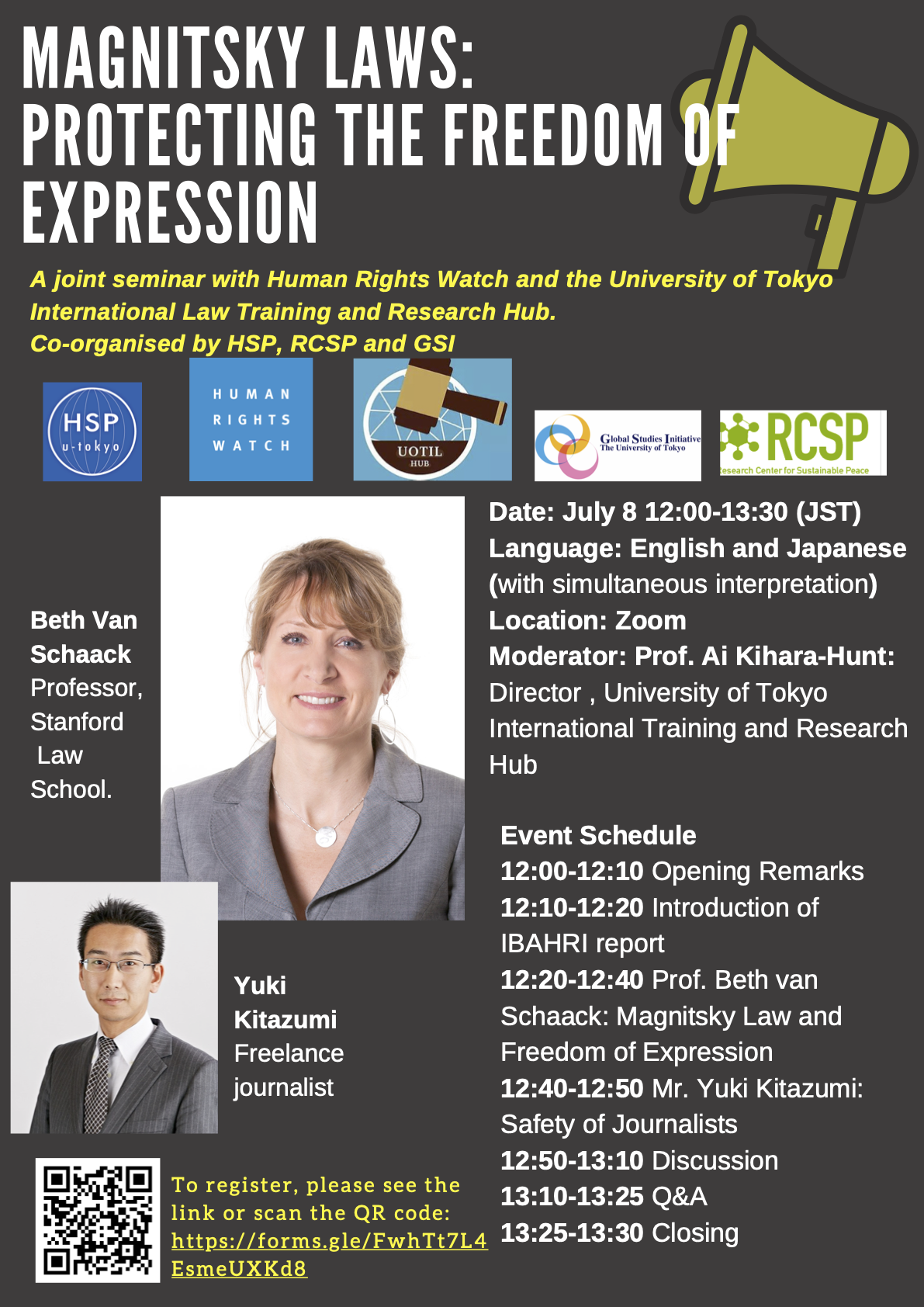
| Title | Magnitsky laws: Protecting the freedom of expression |
| Descriptions | This seminar is the third one on the theme of human rights sanctions laws (Magnitsky laws) and framework. We will discuss how Magnitsky laws work as protection of freedom of expression, including protection of journalists. |
| Date | 8 July 2021 (Thursday), 12:00-13:30 JST(GMT+9) |
| Venue | Zoom (Pre-registration required: https://forms.gle/FwhTt7L4EsmeUXKd8) |
| Lecturers | Beth Van Schaack (Professor, Stanford University Law School); Yuki Kitazumi (Freelance Journalist) |
| Moderator | Ai Kihara-Hunt (Associate Professor, the University of Tokyo) |
| Language | English with simultaneous translation into Japanese |
| Materials | To be distributed at the event, if any. |
| Organizers | Graduate Program on Human Security (HSP), the University of Tokyo; International Law Training and Research Hub, the University of Tokyo; Human Rights Watch |
| Co-organizers | Research Center for Sustainable Peace (RCSP), Institute of Advanced Global Studies (IAGS), The University of Tokyo; Institute of Advanced Global Studies (IAGS), The University of Tokyo |
HSP Symposium “Human Security in Myanmar: The Impact of COVID-19 and the Role of Japan” (Jul. 10, 2021)
| Title | HSP Symposium “Human Security in Myanmar: The Impact of COVID-19 And the Role of Japan” |
| Descriptions | Human security entails freedom from fear. In Myanmar, since the military coup in February, violence and fear have been used to suppress non-violent anti-coup protestors. As a Civil Disobedience Movement (CDM), they demand the restoration of the democratic government according to the results of the November 2020 elections. Despite the peaceful nature of the protests, the number of people killed and arrested by the military continues to rise. Myanmar, a country also hard hit by COVID-19, now faces the additional challenges of a seriously paralyzed economy in the wake of its violent military coup. Humanitarian crisis by food shortage, new influx of refugees and IDPs as well as the escalation of civil war are highly concerned.
For the people of Myanmar, the crisis continues to be amplified by the pandemic. Recent UN interventions have proven ineffective, and negotiations by both ASEAN and Japan have yet to produce any results. In the dilemma of freedom from fear and want, what realistic approach can be taken to restore human security in Myanmar and protect the lives of its people? What reforms might be promoted to safeguard Myanmar’s democratic process? What is the role and responsibility of Japan? How can non-governmental actors, including academia, protect and empower the people of Myanmar, whose human security is now under threat from violence, poverty, fear, and COVID-19? Efforts to protect human security in Myanmar must be undertaken to secure the dignity and safety of the people in Myanmar. For our 2021 academic Spring Symposium, we invite keynote speaker Ms. Zin Mar Aung, appointed Foreign Minister of the National Unity Government (NUG) by the Committee Representing Pyidaungsu Hluttaw of elected parliamentarians at Myanmar’s national elections in November 2020, to share insights on NUG’s approaches and strategies to overcome the situation. A panel discussion is to follow on the roles of academia in Japan, non-governmental actors, and second track collaborations in Asia to address Myanmar’s human security crisis. |
| Date | Saturday, July 10, 2021, from 11:00 to 13:00 (JST) |
| Venue | Online webinar |
| Program | Opening Remarks: Dr. Takumi Moriyama(Dean of the Graduate School of Arts and Sciences, The University of Tokyo) 1st session 2nd session 11:50-12:00 12:00-12:10 12:10-12:20 12:20-12:30 12:30-12:50 12:50-13:00 |
| Moderator | Dr. Yasunobu Sato (Professor, Graduate School of Arts and Sciences, Deputy Director of Research Center for Sustainable Peace, The University of Tokyo) |
| Languages | English and Japanese |
| Materials | Undecided |
| Organizers | Graduate Program on Human Security (HSP), The University of Tokyo; Research Center for Sustainable Peace (RCSP), Institute of Advanced Global Studies (IAGS), The University of Tokyo; Research Center for Sustainable Development (RCDP), Institute of Advanced Global Studies (IAGS), The University of Tokyo |
| Co-organizers | Institute of Advanced Global Studies (IAGS), The University of Tokyo; Global Studies Initiative (GSI), The University of Tokyo |
| Supporters | The Japan Association for Human Security Studies; The Japan Society for International Development; The Japan Chapter of the Asian Society of International Law; Asian Society for International Law; The Society of Researchers for International Development |
| Notes | Application: https://forms.gle/m5BFmyjzJoXsiyYaA |
HSP Seminar (#284) “3.11 震災関連 公開研究会” (Jun. 21, 2021)
HSP Seminar (#283) “Seminar on Sanctioning Human Rights Violations: Comparative Analysis on Magnitsky Laws” (Jun. 17, 2021)
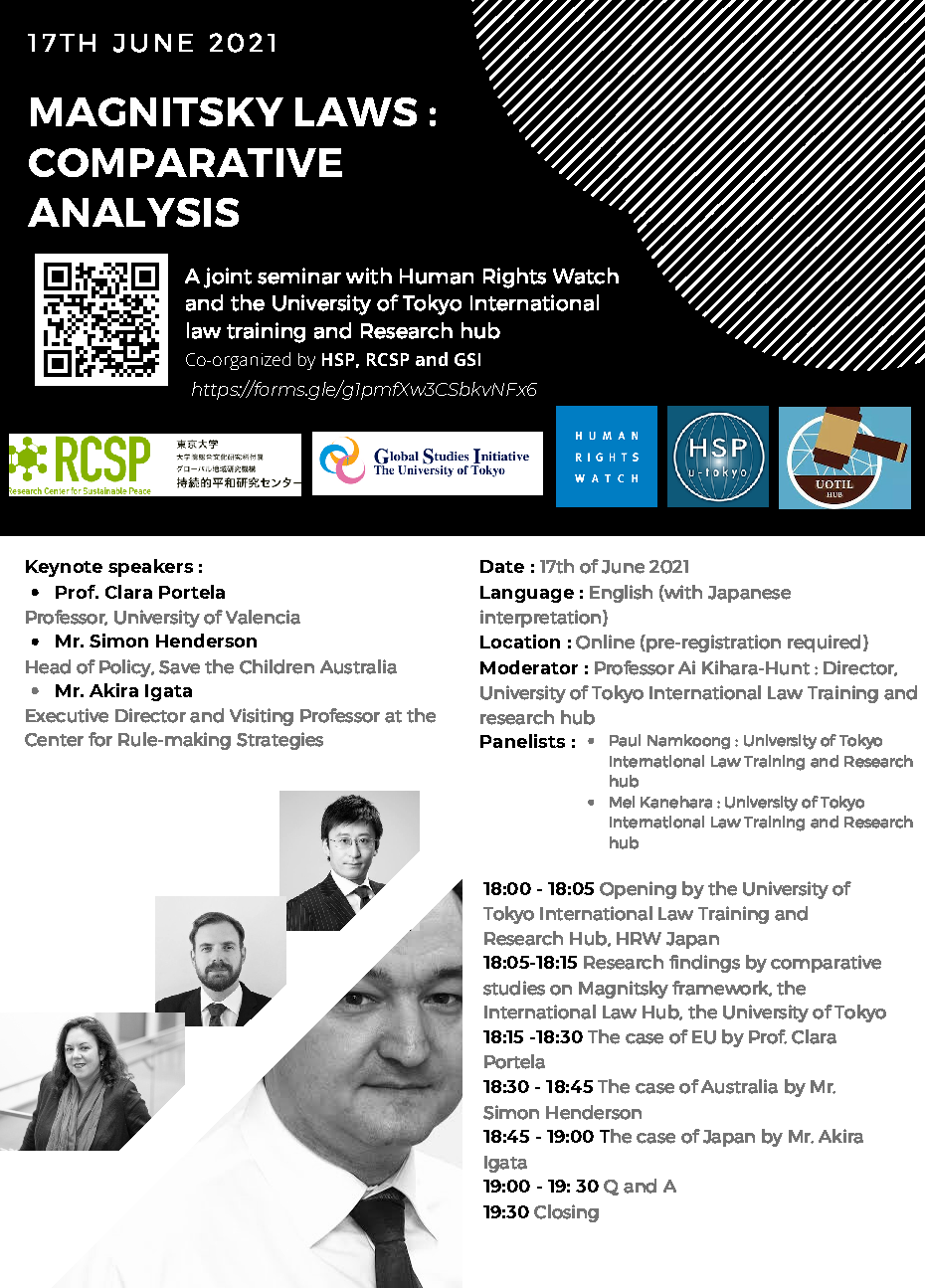
| Title | Seminar on Sanctioning Human Rights Violations: comparative analysis on Magnitsky Laws |
| Descriptions | The goal of the seminar is to discuss what Magnitsky Laws (human rights sanctions laws) are, and can do, through comparative analysis of the situations in three areas: EU, Australia and Japan. |
| Date | 17 June 2021 (Thursday), 18:00-19:30 |
| Venue | Zoom (Pre-registration required: https://forms.gle/g1pmfXw3CSbkvNFx6 ) |
| Keynote Speakers | Clara Portela (Professor, University of Valencia); Simon Henderson (Head of Policy, Save the Children Australia); Akira Igata (Professor, Tama University) |
| Panelists | Paul Namkoong (University of Tokyo International Law Training and Research Hub); Mei Kanehara (University of Tokyo International Law Training and Research Hub) |
| Moderator | Ai Kihara-Hunt (Associate Professor, the University of Tokyo) |
| Language | English with simultaneous translation into Japanese |
| Materials | To be distributed at the event, if any. |
| Organizers | Graduate Program on Human Security (HSP), the University of Tokyo; International Law Training and Research Hub, the University of Tokyo; Human Rights Watch |
| Co-organizers | Research Center for Sustainable Peace (RCSP), Institute of Advanced Global Studies (IAGS), the University of Tokyo; Institute of Advanced Global Studies (IAGS), the University of Tokyo |
HSP Seminar (#282) “People’s Stories Seminar: Human Rights Best Practices in COVID-19 Responses ” (Jun. 11, 2021)
| Title | People’s Stories Seminar: Human Rights Best Practices in COVID-19 Responses |
| Descriptions | The global pandemic and a series of related restrictions have magnified many of the already-existing public health inequalities and vulnerabilities in different segments of society. This inequality and marginalization affects not only in people’s access to the highest attainable health, but also in every sphere of human life. States have struggled to attend to the immediate and long-term challenges that come with the spread of the Coronavirus. The gap had to be filled by non-state actors.
In 2020, the UN Office of the High Commissioner for Human Rights (UN-OHCHR), in search for real examples in the field that can guide stakeholders can learn lessons from, started to collect best practice initiatives where non-state actors have filled the gap effectively. In particular, examples were sought where actors made effective interventions to protect economic, social and cultural rights of vulnerable and marginalized groups – which include existing groups and newly marginalized ones. These examples have been collected in the Crowdsourcing Database. Examples collected are those that either i) protect vulnerable groups that would have been left behind otherwise; ii) protect (a) human right(s) that were not addressed sufficiently; and/or iii) take innovative approach in addressing (an) affected human right(s). The University of Tokyo’s International Law Training and Research Hub (UOTIL Hub) has partnered with the UN-OHCHR, and worked on the collection of best practices in Asia, and submitted a brief report to the UN-OHCHR on the analyses of collected examples from Asia, for its use at the Human Rights Council’s 46th session. In the process of collecting best practice examples, the UOTIL Hub team was highly impressed by various creative, innovative approaches that have been taken by a wide range of actors. In following up on ten of the selected cases to learn more details about them, UOTIL Hub team felt that mere collection of best practices as data would not suffice to deliver human stories of those who have been fighting to provide much needed protection in the field. This seminar aims to convey some of the real human stories from the Hub’s collection of practices, as well as the Hub team’s summary findings. This seminar aims to exhibit how non-state stakeholders came up with novel ways to lessen the health, economic, and social burdens of this unprecedented pandemic on the most vulnerable groups in society. It hopes to enrich debates on the value of using a human rights perspective in formulating frameworks for emergency response. |
| Date | 11 June 2021 (Fri). 18:00~19:30 |
| Venue | Zoom (Pre-registration required: https://bit.ly/3f7Z9v7) |
| Lecturers | Todd Howland (Chief, Development and Economic and Social Issues Branch, UN-Office of the High Commissioner for Human Rights); Chitra Massey (Team Leader, Development and Economic and Social Issues Branch, UN-OHCHR); George Hodge (Methodology, Education and Training Section, UN-OHCHR); Representatives from Door-to-door Education Initiative (Indonesia); Representatives from Philippines Disaster Resilience Foundation (Philippines); Raymond Andaya (PhD student, the University of Tokyo); Chihiro Toya (PhD student, the University of Tokyo); Lauren Power (Adjunct Professor, Temple University); Satoko Haru (Staff, Research Center for Sustainable Peace, the University of Tokyo) |
| Moderators | Ai Kihara-Hunt (Associate Professor, Graduate Program on Human Security (HSP), the University of Tokyo); Raymond Andaya (PhD student, the University of Tokyo); Timothy Massie (Student, the University of Tokyo) |
| Language | English |
| Materials | To be distributed after registration if any. |
| Organizers | Graduate Program on Human Security (HSP), The University of Tokyo; United Nations Office of the High Commissioner for Human Rights (UN-OHCHR); International Law Research and Training Hub, The University of Tokyo |
| Co-organizer | Institute of Advanced Global Studies (IAGS), The University of Tokyo Research Center for Sustainable Peace (RCSP), Institute of Advanced Global Studies (IAGS), The University of Tokyo |
The Recording of the HSP Admission Guidance Session [closed]
We held the 1st HSP Admission Guidance Session on June 5, 2021.
You can watch the recording of the session below until June 18 (Fri.), so please check it out.
Note: The session was held in Japanese.
The recording has been closed.
The 2nd HSP Admission Guidance Session is going to be held in October.
The website of the Graduate School of Arts and Sciences will provide the details later.
The HSP Admission Guidance Session (Jun. 5, 2021)
The HSP Admission Guidance Session will be held as follows. Prospective students are encouraged to come and find more about the HSP.
- Date: June 5 (Sat.), 2021, 13:00-15:00
- Venue: Online (Zoom)
If you would like to join the session, please fill out the form below and press ‘send’ (送信) till June 3 (Thurs.).
On June 4 (Fri.), we will send the link to the registered addresses.
If you do not receive an email until 23:00 on June 4, please contact HSP (hsp-toiawase [at] hsp.c.u-tokyo.ac.jp) by email.
Note: Explanation and instruction will be given in Japanese.
The session has been closed. You can watch the recording of the session until June 18 (Fri.), so please check it out.
HSP Seminar (#281) “International Humanitarian Law seminar series: from basics to Moot court and Role Play” (May 18 – June 1, 2021)
| Title | International Humanitarian Law seminar series: from basics to Moot court and Role Play |
| Descriptions | International Humanitarian Law (IHL) is very important in the current world, where most contemporary armed conflicts are complex and mainly victimize civilians. This seminar series aims to provide necessary IHL training from the basics to the level that we can select those who join the University of Tokyo teams for IHL Moot Court and Role Play competitions and through that, to contribute in raising the next generation IHL practitioners. It is planned that educational materials created by the University’s International Law Training and Research Hub team will be used. Those who are not intending to participate in IHL Moot/Role Play are welcome to join the seminars. If you can only join one seminar, you are also welcome to attend. Those who are intending to join IHL competitions are most encouraged to join all the seminars. |
| Date | 18:30–20:00, 18 May (Tuesday); 18:30–20:00, 25 May (Tuesday); 18:30–20:00, 1 June (Tuesday) |
| Venue | Zoom – registration necessary from https://bit.ly/3fiAz9F |
| Lecturer | Dr. Ai Kihara-Hunt (Associate Professor, Graduate Program on Human Security (HSP), the University of Tokyo) |
| Language | English |
| Materials | To be distributed to registered people. |
| Organizer | Graduate Program on Human Security (HSP), The University of Tokyo |
| Co-organizer | Research Center for Sustainable Peace (RCSP), Institute of Advanced Global Studies (IAGS), The University of Tokyo |
| Notes | There will be guests. |
(日本語) 2022年度修士課程(社会人特別選抜)学生募集要項
The Report on the HSP Seminar (#271) “International Leadership in the 21st Century: Themes, Contexts, and Critiques”
The Report on the HSP Seminar (#271) “International Leadership in the 21st Century: Themes, Contexts, and Critiques” (Nov. 7, 2020) can be downloaded from here:
HSP Seminar (#280) “The Roles and Responsibilities of IFIs beyond COVID-19 – AIIB’s Innovative Features in Governance and International Standards” (Mar. 16, 2021)
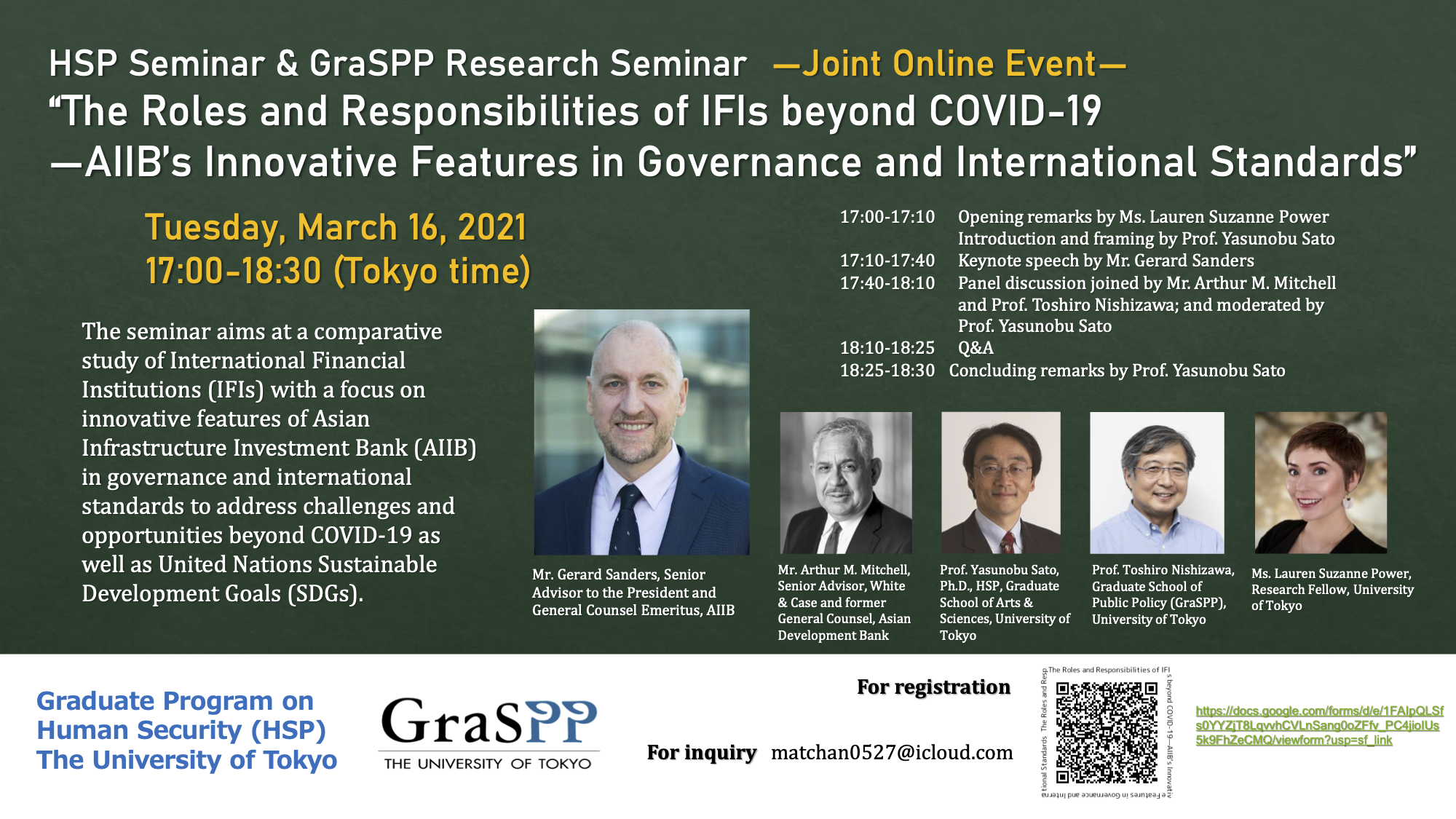
| Title | GraSPP Research Seminar & HSP Seminar –Joint Online Event– “The Roles and Responsibilities of IFIs beyond COVID-19 – AIIB’s Innovative Features in Governance and International Standards” |
| Descriptions | The seminar aims at a comparative study of International Financial Institutions (IFIs) with a focus on innovative features of Asian Infrastructure Investment Bank (AIIB) in governance and international standards to address challenges and opportunities beyond COVID-19 as well as United Nations Sustainable Development Goals (SDGs). |
| Date | Tuesday, March 16, 2021 17:00-18:30 (Tokyo time)
17:00-17:10 Opening remarks by Ms. Lauren Suzanne Power |
| Venue | Online webinar |
| Lecturers | Keynote speech Mr. Gerard Sanders, Senior Advisor to the President and General Counsel Emeritus, Asian Infrastructure Investment Bank (AIIB) Discussion |
| Moderators | Ms. Lauren Suzanne Power, Research Fellow, University of Tokyo Prof. Yasunobu Sato, Professor, Graduate Program on Human Security (HSP), Graduate School of Arts & Sciences, University of Tokyo |
| Language | English |
| Materials | Preparing |
| Organizers | Graduate School of Public Policy (GraSPP), The University of Tokyo; Research Center for Sustainable Peace (RCSP), Institute of Advanced Global Studies (IAGS), The University of Tokyo; Graduate Program on Human Security (HSP), The University of Tokyo |
| Notes | Registration: here |
HSP Seminar (#279) “Symposium on Sanctioning Human Rights Violations: Magnitsky Laws in the World – Lessons Learned” (Mar. 12, 2021)
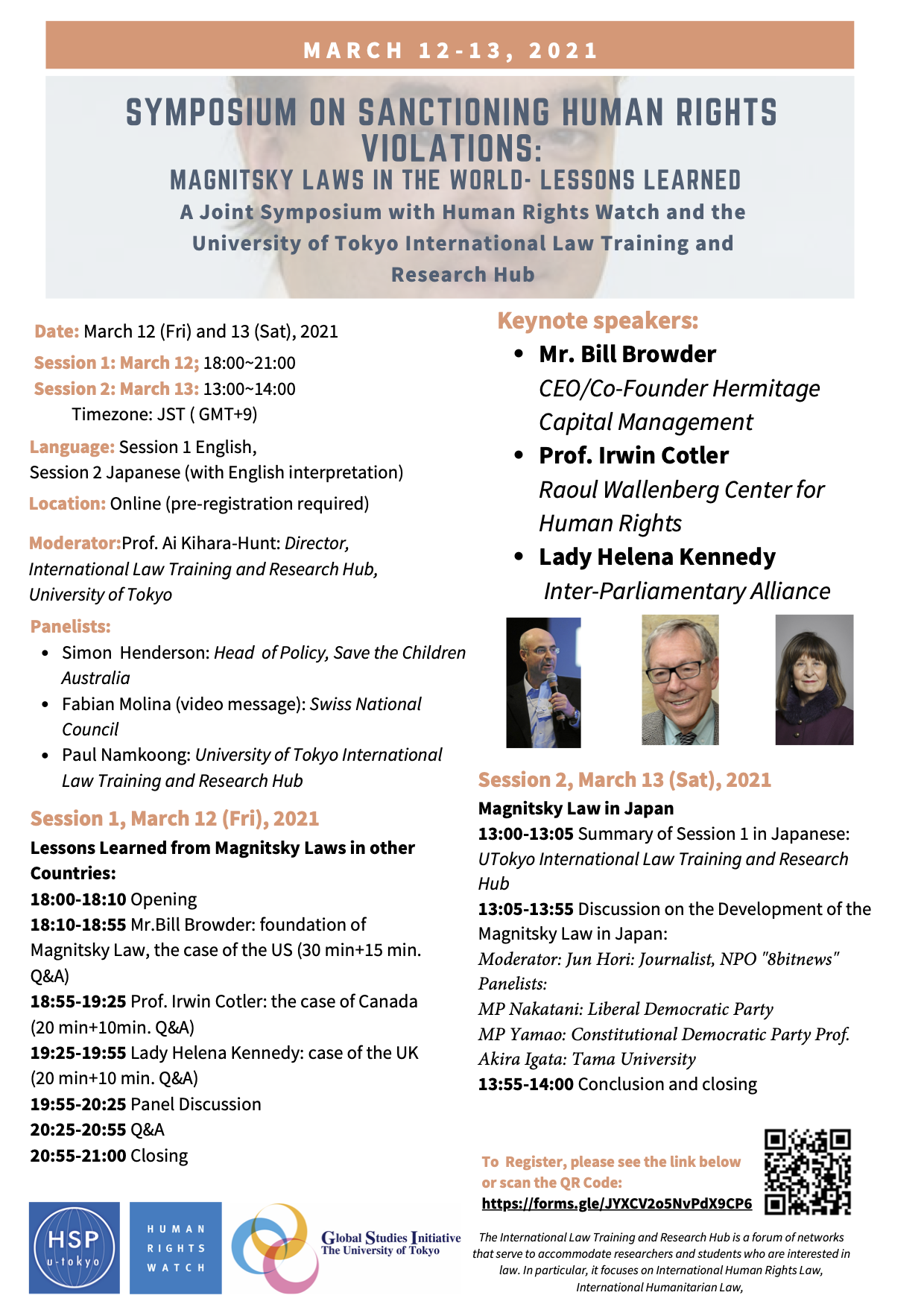
| Title | Symposium on Sanctioning Human Rights Violations: Magnitsky Laws in the World – Lessons Learned |
| Descriptions | The goal of the symposium is to disseminate and generate public knowledge in Japan of the Magnitsky Laws and their significance within human rights movements. It brings together some of the most noted contributors in human rights discourse to discuss lessons learned in the utilization of the Magnitsky Law in the the US, Canada, and the UK. Cases of countries that are in the process of introducing Magnitsky Laws, including Australia, Switzerland and Japan will be discussed. Session 2 is focused on Japan. |
| Dates | Session 1 : 12 March 2021 (Friday), 18:00–21:00; Session 2 : 13 March 2021 (Saturday), 13:00–14:00 |
| Venue | Zoom (Pre-registration required: https://forms.gle/JYXCV2o5NvPdX9CP6 ) |
| Keynote Speakers | Session 1: Mr. Bill Browder (CEO/Co-Founder Hermitage Capital Management); Prof. Irwin Cotler (Raoul Wallenberg Center for Human Rights); Lady Helena Kennedy (Inter-Parliamentary Alliance) |
| Panelists | Session 1: Simon Henderson (Head of Policy, Save the Children Australia); Fabian Molina (Swiss National Council); Paul Namkoong (University of Tokyo International Law Training and Research Hub) Session 2: |
| Moderators | Session 1: Ai Kihara-Hunt (Associate Professor, the University of Tokyo) Session 2: |
| Languages | Session 1: English; Session 2: Japanese (with online interpretation) |
| Materials | To be distributed at the event. |
| Organizers | Graduate Program on Human Security (HSP), the University of Tokyo; Human Rights Watch |
| Co-organizers | Global Studies Initiative, the University of Tokyo; International Law Training and Research Hub, the University of Tokyo |
本プログラム教員のプロジェクトが国際的な学術情報誌で紹介されました。
「人間の安全保障」プログラム教員の阪本拓人准教授が研究代表者を務める以下の研究プロジェクトが、国際的な学術情報誌 Impact で紹介されました。
- 科研費基盤研究(A)18H03621「持続的な平和と開発のためのガバナンス:ネットワーク科学とデータ科学を用いた研究」
HSP Seminar (#278) “The possibilities for cooperation with Cambodia through civil society in the age of SDGs: Japan’s role amid COVID-19 and new US-China tensions” (Feb. 22, 2021)
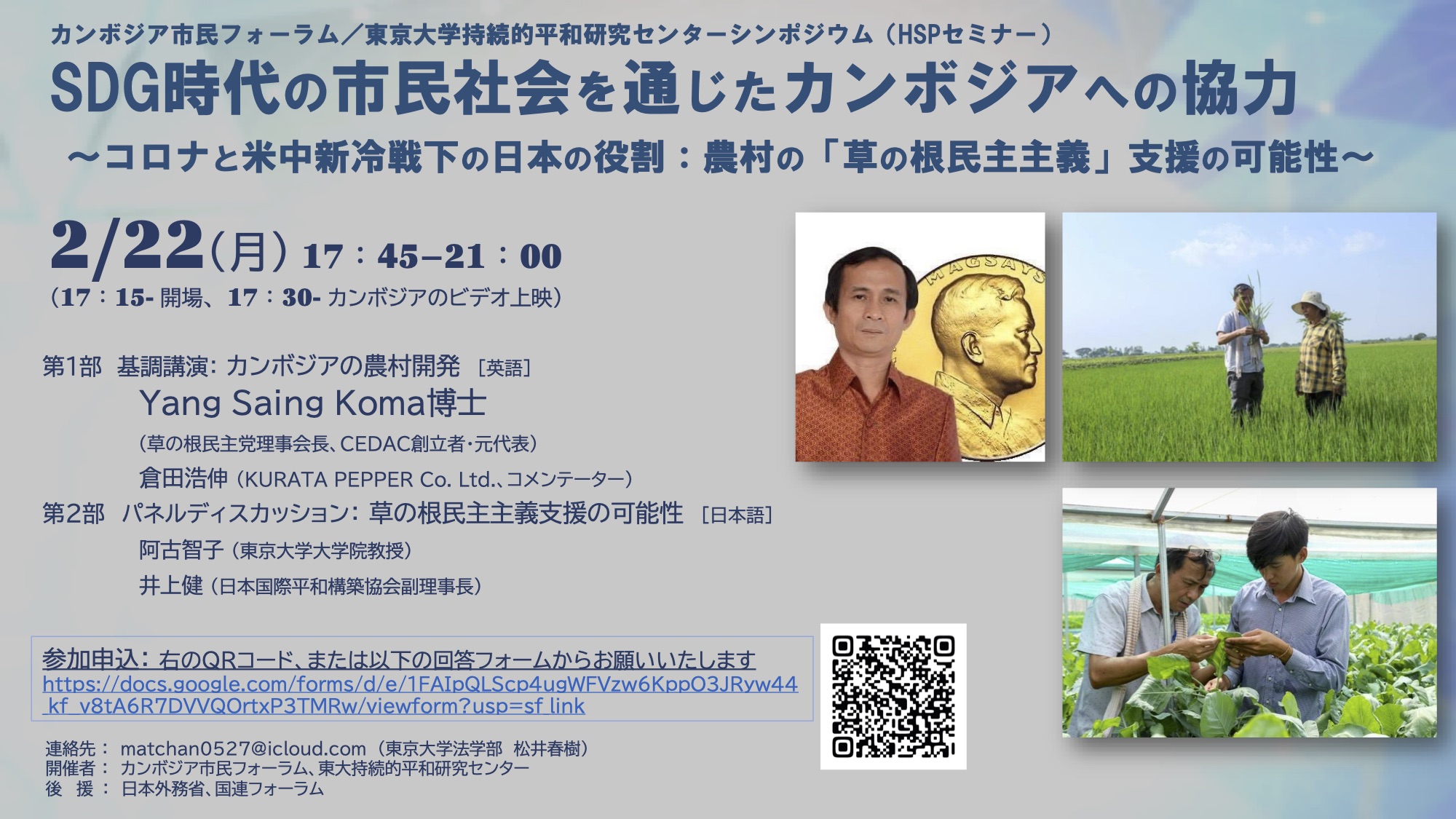
| Title | The possibilities for cooperation with Cambodia through civil society in the age of SDGs: Japan’s role amid COVID-19 and new US-China tensions |
| Descriptions | In Session 1, Mr. Koma will discuss the problems and possibilities of agricultural development in Cambodia in relation to Japanese agricultural support. In Session 2, the topic of civil society in Japanese ODA and her governance support will be discussed within the context of the growing influence of China on Cambodia. Finally, with the inclusion of SDG16+ research institutes (http://cdr.c.u-tokyo.ac.jp/RCSP/topics/869.html), a call to action by Japanese NGOs, in particular, PFCJ, to JICA, the Japanese government and Japanese Private Sector. |
| Date | Month Date, 2021 (Mon.) 17:45 – 21:00(Open from 17:15, Screening a video from 17:30) |
| Venue | Online webinar |
| Lecturers | 1st session: Keynote speech Dr. Yang Saing Koma (Chairman of the Board of the Grassroot Democratic Party, CEDAC founder and former representative. To participate online) 2nd session: Panel discussion |
| Commentators | 1st session: Hironobu Kurata (KURATA PEPPER Co. Ltd. Commentator, participating online) 2nd session: |
| Moderators | General Moderator: Ryu Morita (Executive Director, Japan Overseas Christian Medical Cooperative Service) 1st session: 2nd session: |
| Languages | English, Japanese |
| Materials | Preparing |
| Organizers | Graduate Program on Human Security (HSP), The University of Tokyo; People’s Forum for Cambodia, Japan (PFCJ); Research Center for Sustainable Peace (RCSP), Institute of Advanced Global Studies (IAGS), The University of Tokyo |
| Supporters | Ministry of Foreign Affairs of Japan; United Nations Forum |
| Notes | Application: Google Form Contact: Haruki Matsui (Student, University of Tokyo) |
HSP Seminar (#277) “3.11 震災関連 公開研究会” (Jan. 30, 2021)
HSP Seminar (#276) “3.11 震災関連 公開研究会” (Jan. 23, 2021)
HSP Seminar (#275) “Participation of the Civil Society in UN Human Rights Mechanisms- On the occasion of the publication of the book “United Nations Commission on Human Rights” with Dr. John Pace.” (Jan. 27, 2021)
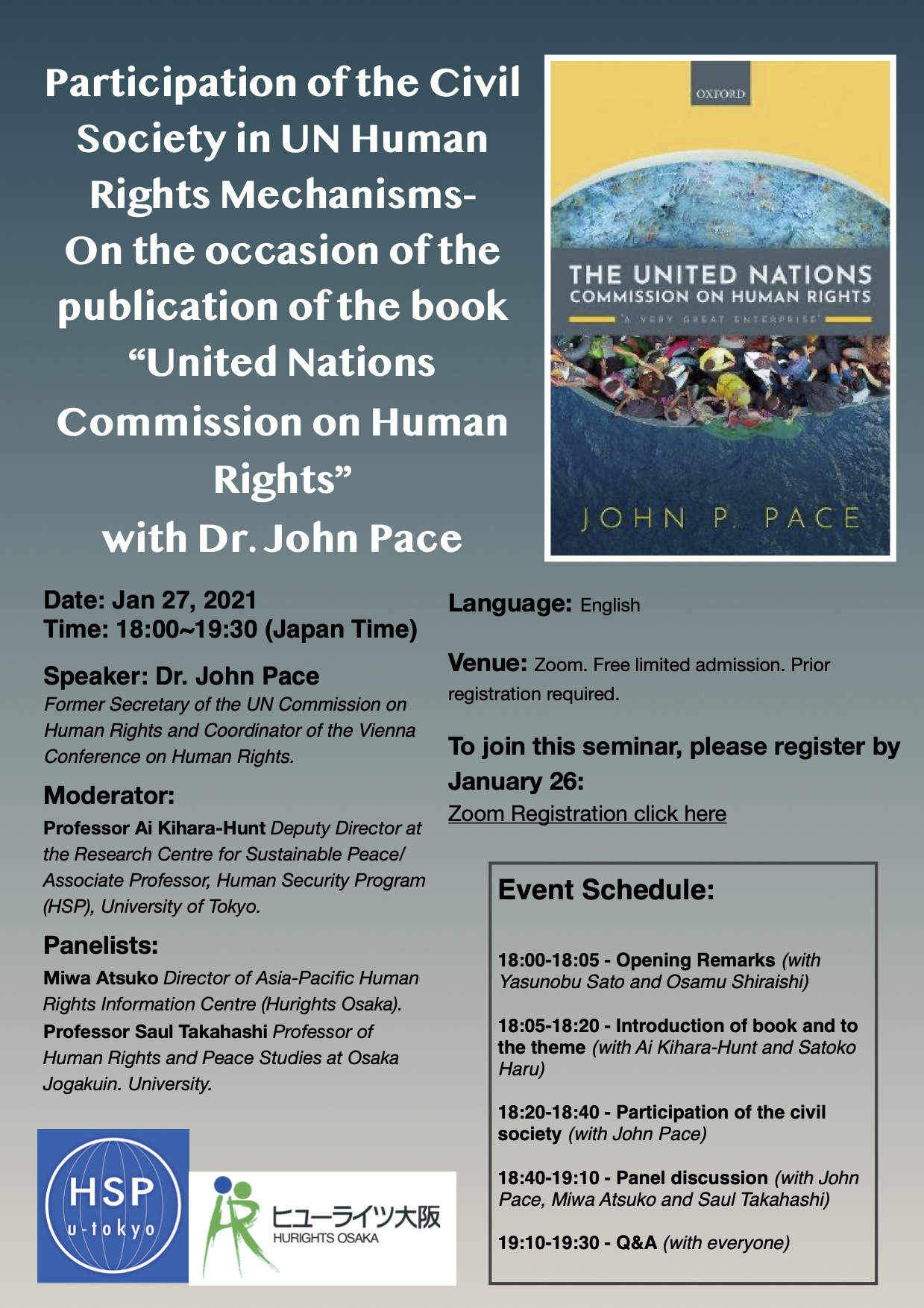
| Title | Participation of the Civil Society in UN Human Rights Mechanisms- On the occasion of the publication of the book “United Nations Commission on Human Rights” with Dr. John Pace. |
| Descriptions | This seminar is in celebration of the publication of the book The United Nations Commission on Human Rights by Dr. John Pace, who served as Secretary for the Commission for 16 years. The book itself is a very detailed and factual record of each session of the Commission. Based on the thorough collection of information, recommendations are made to make the Human Rights Council a body with all UN Member States, and to have civil society consultation as a more integrated part of the UN’s human rights machinery. In the seminar, the author of the book will discuss his findings about the UN Commission on Human Rights, and panelists from the civil society and academia will join him in capturing lessons learned from the past and exploring the future of human rights. |
| Date | 27 January 2021 (Wed). 18:00~19:30 |
| Venue | Zoom (Pre-registration required: https://forms.gle/BSC13tMb98rGyHH89) |
| Lecturer | Dr. John Pace (former Secretary, UN Commission on Human Rights) |
| Commentators | Ms. Atsuko Miwa, Director (HURIGHTS Osaka); Prof. Saul Takahashi (Osaka Jogakuin University) |
| Moderator | Ai Kihara-Hunt (Associate Professor, Graduate Program on Human Security (HSP), the University of Tokyo) |
| Language | English |
| Materials | To be distributed after registration if any. |
| Organizer | Graduate Program on Human Security (HSP), The University of Tokyo |
| Co-organizers | Research Center for Sustainable Peace (RCSP), Institute of Advanced Global Studies (IAGS), The University of Tokyo; HURIGHTS Osaka |
HSP Seminar (#274) “International Criminal Court: Its Establishment and Challenges” (Jan. 15, 2021)
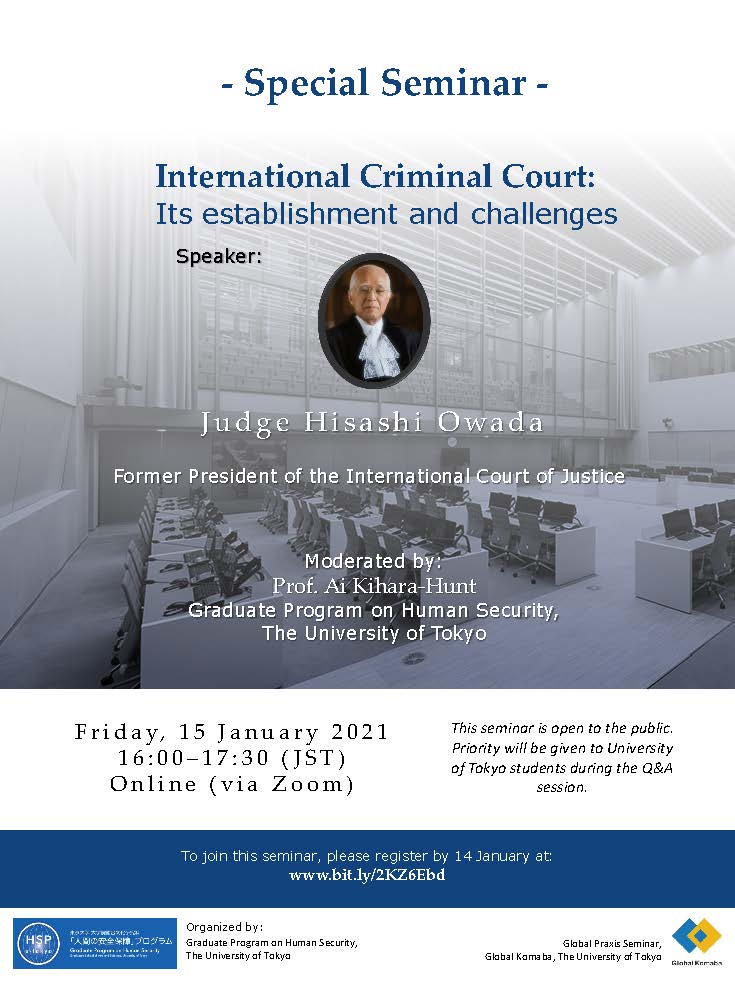
| Title | International Criminal Court: Its Establishment and Challenges |
| Descriptions | In this seminar, the speaker will discus the development and challenges of the International Criminal Court, with episodes from his experience in heading the Japanese delegation at the time of the establishement of the Court. |
| Date | 15 January 2021 (Fri), 16:00-17:30 |
| Venue | Zoom (Link will be sent to those registered. Register by 14 January at: www.bit.ly/2KZ6Ebd) |
| Lecturer | Mr. Hisashi Owada (Former President and Judge, International Court of Justice) |
| Moderator | Ai Kihara-Hunt (Associate Professor, Graduate Program on Human Security (HSP), the University of Tokyo) |
| Language | English |
| Materials | To be distributed to registered participants. |
| Organizers | Global Praxis class, Global Komaba, The University of Tokyo; Graduate Program on Human Security (HSP), The University of Tokyo |
| Supporter | Research Center for Sustainable Development, Institute of Advanced Global Studies (IAGS), The University of Tokyo |




